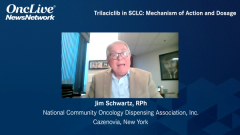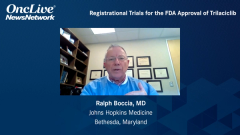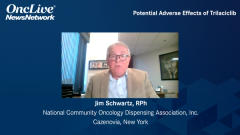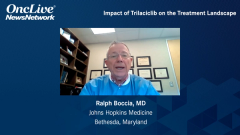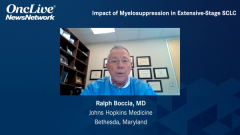
Impact of Trilaciclib on the Treatment Landscape
Ralph Boccia, MD, and Jim Schwartz, RPh, discuss the overall impact the approval for trilaciclib will have on patients’ treatment outcomes, health care expenses, and quality of life.
Ralph Boccia, MD: We’re all pleased with the FDA approval and the NCCN [National Comprehensive Cancer Network] recommendations to use trilaciclib in the population of patients with extensive small-cell lung cancer, given these very myelosuppressive drugs. It’s clearly been an unmet need because all patients have experienced neutropenic fever, hospital admissions, drug reductions, severe quality-of-life-imposing situations. It will be nice to finally have available, in an FDA-approved context, a drug that has multilineage potential to be myelo-protected. With the NCCN recommendation and the data, we can easily justify treating all our patients who are getting EC [etoposide, carboplatin] with or without I/O [immuno-oncology] or topotecan to get this drug.
There’s no drug that isn’t going to be a cost to patients. We always worry about the pharmacoeconomics, but if you think about all the cytokines that we use in the population of patients with extensive small-cell lung cancer given EC [etoposide, carboplatin], there probably is going to be something similar in price or perhaps even a cost savings. It’s easy to justify on a cost basis. The other thing is that it’s important to improve the patient’s quality of life, as we said. If we can spare the patient from needing to go to the hospital, if we can spare the patient from being admitted to the hospital, if we can stay on therapy for the full 4 cycles that these patients require, then the outcomes may be better in a general standpoint.
Jim Schwartz, RPh: We’ve gone through all the information on trilaciclib and the effect it has in use in patients with small cell lung cancer. In terms of access, it’s available at all the major wholesalers. Getting it should not be a problem. The question is getting it approved and paid for. In terms of reimbursement, it’s a new drug, so it will be billed through Medicare with a miscellaneous code, NOC [not otherwise classified], usually J3490. For 6 months it’s going to be billed at WAC [wholesale acquisition cost] times 6. After that, it will have an ASP [average sales price]. The important thing is it should take away or greatly diminish the use of growth factors. The WAC price of one 300-mg dose of trilaciclib is about $1400. More patients than not will get 2 doses, so that’s about $2,800 WAC price. The WAC price of the pegfilgrastim is over $5000, even for the cheapest biosimilar. So if just 1 dose of trilaciclib can take out the cost of that 1 pegfilgrastim, it is really going to be a big benefit.
In terms of problems with reimbursement, any new drug always has problems when it first comes out if it’s got a miscellaneous code. The manufacturer will go to the payers and explain the incident and what effect this will have, not only on the patient’s outcome—to be able to stay on the drug longer at the correct dose—but also on cutting out a certain percentage of the use of growth factors, which will be a drug savings and doesn’t happen too often. Usually, drugs come out and they’re almost as expensive as the previous therapy. In this case, it should cut other expenses, and that’s a gain for everybody. The patient gets better treatment, with fewer adverse effects, and at a lower cost. The NCCN update that includes use of trilaciclib indicates that it’s for curative, adjuvant, or palliative settings or as secondary prophylaxis in small-cell lung cancer. It also has a specific indication to decrease the use of GCSF, which is what it’s intended to do, along with making the chemotherapy be used longer. Once the payers, Medicare, and Medicaid understand the value of this drug, it should not be a problem. As I said, all new drugs get access pretty slowly, but this drug should be taken up quickly because it’s cheaper, it’s very effective, and it’s going to be good for the patients in treating their small-cell lung cancer.
Ralph Boccia, MD: We finally have something that can improve outcomes, potentially by reducing the pancytopenia from the myelotoxicity in patients given EC [etoposide, carboplatin] or topotecan with extensive small-cell lung cancer. We’ve already seen that this reduces the need for these agents, exposure to the hospital, and has the potential to improve quality of life. There have been some looks at patient-reported outcomes, and we expect that to be published at some point in the future, so stay tuned. Meanwhile, the FDA has approved the drug, which means that we can give the drug and get authorized for payment. The NCCN has given us a recommendation that effective use and should be considered. So we plan to continue using it. We were part of the clinical trial. We plan to use it on all our patients getting EC [etoposide, carboplatin] and topotecan for that reason.
Transcript Edited for Clarity


